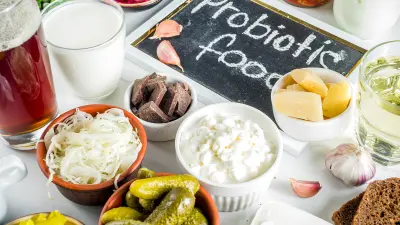From gummies to yogurts to powders, probiotics seem to be everywhere in children’s health products. But is more always better—especially when it comes to your child’s gut? According to neuroscientist Dr. Andrew Huberman, the real key to supporting your child’s mood, immunity, and brain function might lie not in supplements but in your fridge. Fermented foods, he says, can offer a more balanced and effective way to nourish the gut microbiome—without the risk of overdoing it. And with the right choices, they can be delicious and kid-friendly, too.
Here are some of the key takeaways for your kids from Andrew Huberman’s podcast interview with Dr. Chris Palmer:
1. Fermented Foods Naturally Support a Healthy Microbiome
- What they are: Fermented foods include yogurt, kefir, sauerkraut, kimchi, miso, and even pickles (when traditionally fermented).
- Why they matter: These foods contain naturally occurring probiotics that help promote a balanced gut microbiome, which in turn supports digestion, immunity, and even mental health.
- Unlike isolated probiotic strains found in supplements, fermented foods offer a more diverse microbial profile—and they come packaged with enzymes, fiber, and other nutrients.
“Fermented foods support healthy gut microbiota without tipping into brain fog or overgrowth.” — Dr. Andrew Huberman
2. Overdoing Probiotic Supplements Can Backfire
- While probiotic supplements can be helpful in certain cases (such as after antibiotics), Huberman warns that high doses or long-term use—especially of isolated strains like lactobacillus—can cause unwanted side effects.
- One of the most common? Brain fog, or a cloudy, sluggish mental state that some people (including kids) experience when the gut microbiome becomes unbalanced by excessive supplementation.
“There are studies that show that if you take lots and lots of certain probiotics… it is not a case of more is better.” — Dr. Andrew Huberman
- Psychiatrist Dr. Chris Palmer, author of Brain Energy, also emphasizes the gut-brain connection in mood disorders, suggesting that the microbiome is a foundational part of mental health in both children and adults.
“The gut microbiome can either contribute to or protect against metabolic and psychiatric symptoms.” — Dr. Chris Palmer
3. Just Two Servings a Day Can Improve Mood and Resilience
- A growing body of research shows that just two servings of fermented foods per day can measurably improve markers of inflammation and emotional well-being.
- For kids, this might look like:
- A yogurt with breakfast
- A spoonful of sauerkraut with dinner
- A small glass of kefir as a snack
- These foods are generally safe, well-tolerated, and easier to introduce than pills or powders.
4. Fermented Foods Are Kid-Friendly—and Harder to Overdo
- Because fermented foods are naturally balanced with fiber and acids, the risk of “overdosing” is much lower compared to supplements.
- They’re also easier to integrate into family meals—especially with milder flavors like yogurt, dill pickles, or even sourdough bread.
- Bonus: Fermented foods may also increase nutrient absorption and support better digestion, leading to more consistent moods and energy throughout the day.
Nurture the Gut and the Brain
While probiotic supplements can play a role in gut health, especially under medical guidance, fermented foods are a safer, more natural way to support your child’s microbiome—and their mood. By incorporating just a couple of servings per day, you can nurture both the gut and the brain, laying the groundwork for better focus, emotional balance, and immunity. And with a little creativity, you might even find that your kids enjoy these foods more than you’d expect.








Leave a Reply